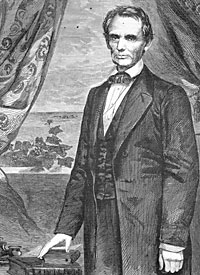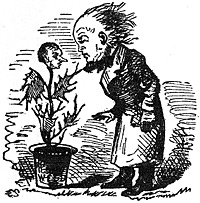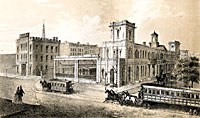Republicans had never held the Presidency. Democrats had held it for eight years. There was considerable pressure not only regarding the Cabinet but virtually the entire slate of federal employee positions. Since no one had civil service protections, Republicans hungered after virtually every available office. The stakes were large.
The fight over patronage which consumed Mr. Lincoln after the election was really a fight over political power and a continuation of fights that had been going on for a decade or more. The fight took place on several levels — first over the Cabinet, second over New York patronage posts. It was complicated by the Senate election to replace William H. Seward in February 1861. The election, wrote historian Sidney David Brummer, “was party of a series of operations for the control of the party in the State, and more than that, for an influential position in shaping the policy and the distribution of patronage of the incoming national administration.”1
Thurlow Weed visited President-elect Lincoln in Springfield in late December and discussed possible cabinet appointments at length. “Weed came back from Springfield, Seward joining him on the train at Syracuse, and between there and Albany they discussed the situation. Seward was willing to accept Lincoln’s three proposals [for solving the secession crisis] and champion them in the Senate, but the Cabinet was not shaping up as he and Weed had hoped it would,” wrote historian Glyndon Van Deusen.2 Navy Secretary Gideon Welles later wrote:
After the election in November efforts were made to induce Mr. Lincoln to visit Auburn and consult with Mr. Seward in regard to the policy of his administration, and the selection of the members of his cabinet, But no argument or urging could persuade him to such a step. He had too much self-respect and self-reliance to listen for a moment to those who approached him on the subject. While modest and unassuming, ready to listen and anxious to inform himself, he knew too much of the proprieties of his position, and what was due to it to put himself in training or in the keeping of any man or men. These seductive and officious invitations and tenders from the Albany politicians did not give additional strength to, nor promote their schemes and the particular views of the school that offered them. They were fully understood and rightfully appreciated and disposed of.Finding that Mr. Lincoln would not visit Auburn to receive lessons, it was concluded that Thurlow Weed should again visit Springfield as the representative of Mr. Seward. Messrs Davis and Swett, with whom Weed had previously conferred, suggested, perhaps invited him, or someone possessed of the views and wishes of the Auburn statesman and politicians, to visit Mr. Lincoln. On this hint Mr. Weed, the confidant and oracle and organ of the sage of Auburn, went to Springfield the latter part of December, had one or two interviews with the President-elect, and succeeded in ascertaining the names of the gentlemen whom he proposed to invite to his cabinet. Mr. Weed, in his autobiography, has narrated with some ‘mental obliquities’ as he has since confessed, his account of those interviews. The plans and purposes of Mr. Lincoln were by no means satisfactory to the representative of the Albany policy.He protested against it from the start as too Democratic, but failed to change the mind of the President as regards any one of the gentlemen whom he had selected. Having himself been a Whig in his antecedents, and some of the gentlemen whom he selected being of like politics, the President desired, contrary to the Albany policy, to have some Republicans of very pronounced Democratic views and antecedents in his council. He preferred also, to choose his own associates and advisors rather than that others should choose for him — to have his own friends instead of another man’s friends for consultation and advice. It was also his aim and intention to avoid giving his administration a political bearing that should preponderate with either of the old parties for neither of which had he any profound regard. The intense partyism of Mr. Seward’s agent did not strike Mr. Lincoln favorably, and caused him to hesitate in regard to Mr. Seward himself, in whose name and behalf the Auburn envoy addressed him. Nor was Mr. Lincoln inclined to give Weed his confidence though he yielded so far as to name to him, as the representative of Mr. Seward, the individuals he proposed to call around him. These names so disturbed Weed, who objected to Democrats like Welles and Blair, as particularly obnoxious, that the President on the earnest solicitation of Weed and the advice of others concluded to withhold a full committal until he reached Washington. He had, however, before the advent of Mr. Seward’s agent in Springfield, been confirmed in his impressions respecting both these gentlemen who were so violently assailed.3
Some of President Lincoln’s most important appointments were:
- Rufus F. Andrews, appointed Surveyor of the Port. He was removed September 5, 1864.
- Hiram Barney, appointed Collector of the Port in 1861. He was removed September 5, 1864.
- Richard M. Blatchford, appointed minister to the Vatican in 1862.
- George Dennison, appointed Naval Officer in 1861.
- Andrew B. Dickinson, appointed U.S. Marshal in 1861 and later Minister instead.
- Simeon Draper, appointed Collector of Port of New York, September 1864.
- John Hogeboom, appointed Customs appraiser at large in February 1864.
- James Kelly, appointed Postmaster in September 1864.
- Thomas McElrath, appointed general appraiser in 1861 and served until 1864.
- E. Delafield Smith, appointed District Attorney for Southern District in 1861.
- William B. Taylor, appointed Postmaster in 1861. He was replaced in 1862.
- Abram Wakeman, appointed New York Postmaster in March 1862. He was appointed Surveyor of Port of New York, September 1864.
Footnotes
- Sidney David Brummer, Political History of New York State During the Period of the Civil War, p. 128.
- Glyndon Van Deusen, William Henry Seward, p. 241.
- Roy P. Basler, editor, The Collected Works of Abraham Lincoln, Volume IV, p. 171 (Letter to Lyman Trumbull, January 7. 1861).








